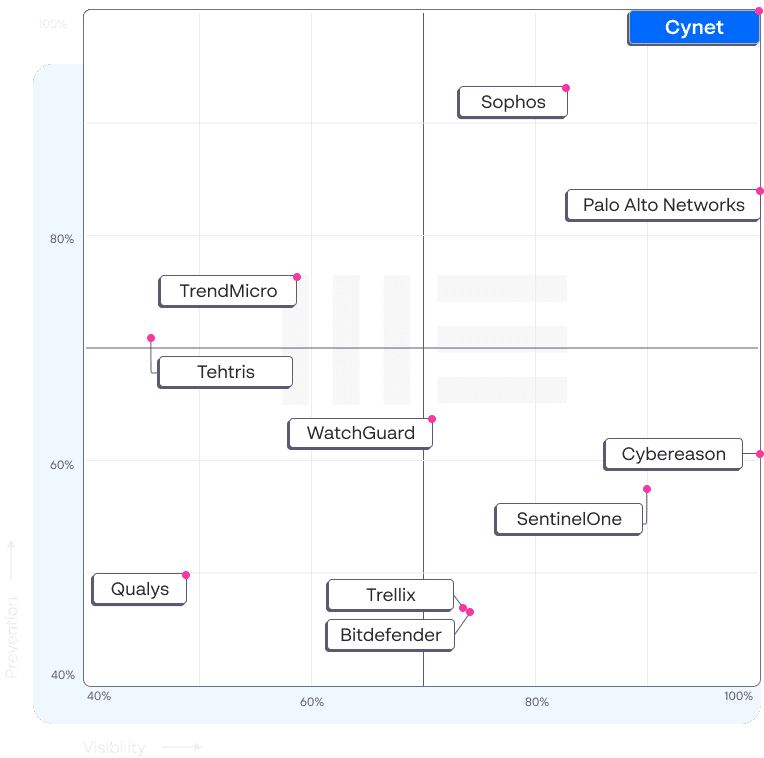
100%
Detection Visibility
77 of 77 Attack Sub-Steps with no configuration changes
100%
Technique Coverage
77 of 77 Technique level Detections with no configuration changes
100%
Protection Rate
10 of 10 Malicious Steps Blocked
Zero
False Positive Detections
0 of 20 Legitimate Sub-Steps Flagged as Malicious
MITRE ATT&CK Evaluations: Outstanding Results
Cynet delivers 100% protection and 100% detection visibility with zero configuration changes and zero delayed detections.
The 2024 MITRE ATT&CK Evaluation
What is the 2024 MITRE ATT&CK Evaluation?

The 2024 MITRE ATT&CK Evaluation is an independent assessment designed to evaluate the effectiveness of cybersecurity solutions against real-world attack scenarios.
Using the globally respected MITRE ATT&CK framework, it tests vendors’ ability to detect, respond to, and report on adversarial tactics, techniques, and procedures (TTPs). This evaluation offers cybersecurity leaders crucial insights into how well different platforms perform under realistic attack conditions.
What it isn't
MITRE doesn’t rank or score participant results. Instead, the raw test data is published along with some basic online comparison tools. It’s up to the vendor participants to analyze and present their results. MITRE does not interpret results or confirm participants’ evaluations of their results.
Cybersecurity vendors are not one-size-fits-all
Use the MITRE ATT&CK results to help you determine if a vendor can meet your specific needs.
Cynet is the leader in
Overall Threat Visibility and Protection
Cynet is the only vendor that delivered both 100% Visibility and 100% Protection with no configuration changes!
100%
Detection Visibility
Perfectly detecting every attack action using no configuration changes and no delays.
100%
Protection Rate
Blocked every one of the 10 attacks steps – allowing no malicious activity to execute!
How MITRE ATT&CK Evaluations Work
The 2024 MITRE ATT&CK Evaluation uses a multi-stage approach to assess the effectiveness of cybersecurity tools. The 2024 evaluation features two adversary scenarios: ransomware targeting Windows and Linux systems, and cyber operations by the Democratic People’s Republic of Korea (DPRK) focusing on macOS, which represent today’s most demanding real-world attack behaviors, testing how solutions perform under realistic conditions.
01
Adversary Emulations
Ransomware: The ransomware emulation simulates behaviors common in global ransomware campaigns, including exploiting legitimate tools, encrypting data, and disabling essential processes. It evaluates defensive capabilities against rapidly evolving threats like Ransomware-as-a-Service (RaaS).
DPRK Operations: The DPRK scenario focuses on macOS, leveraging multi-stage, modular malware techniques. It simulates advanced tactics such as privilege escalation and credential harvesting, highlighting the growing sophistication of DPRK’s cyber campaigns.
02
Technique Scope
Each scenario incorporates specific ATT&CK techniques. For example, the ransomware emulation includes a subset of Linux techniques, while the DPRK emulation emphasizes macOS-specific behaviors. The evaluation makes use of the ATT&CK Navigator to detail the in-scope techniques for each adversary profile.
03
Detection and Protection Categories
Participants are evaluated based on their ability to detect and respond to simulated threats. Detection is classified into five main categories based on the level of detail and context provided to end users. Protection metrics assess the capability of solutions to prevent attacks in real-time.
04
False Positive Metrics
The evaluation also tests participants’ solutions for accuracy. False positives—incorrectly identifying benign activities as malicious—are measured using examples such as legitimate file-sharing tasks or routine system activities. This metric helps assess the balance between proactive detection and minimizing unnecessary alerts.
05
Evaluation Environment
Testing takes place in a cloud computing environment that mimics real-world infrastructures. Supported systems include Windows Server 2022, Windows 11, Ubuntu 22.04 LTS, and macOS Sonoma 14 on Apple Silicon. Participants may also utilize AWS Traffic Mirroring for advanced traffic analysis.
What Differentiates the MITRE ATT&CK Evaluations?
The MITRE ATT&CK Evaluations stand out from other assessments due to their focus on real-world conditions, transparency, and alignment with a widely recognized threat framework:
Real-World Conditions
These evaluations simulate TTPs used by specific threat actors, offering security leaders a realistic view of how solutions would perform against actual adversaries.

Broad Vendor Participation
With participation from a diverse range of cybersecurity vendors, the evaluation offers a comprehensive view of the current cybersecurity landscape.
Transparent Results
Unlike other evaluations, MITRE ATT&CK does not rank vendors or assign scores. Instead, it provides detailed data on how each platform responds to different TTPs, enabling organizations to identify solutions tailored to their unique needs
Framework Integration
The results are directly aligned with the MITRE ATT&CK framework, allowing security teams to integrate the findings into their threat models and address detection and response gaps effectively.
Want to know more about Cynet’s performance?
